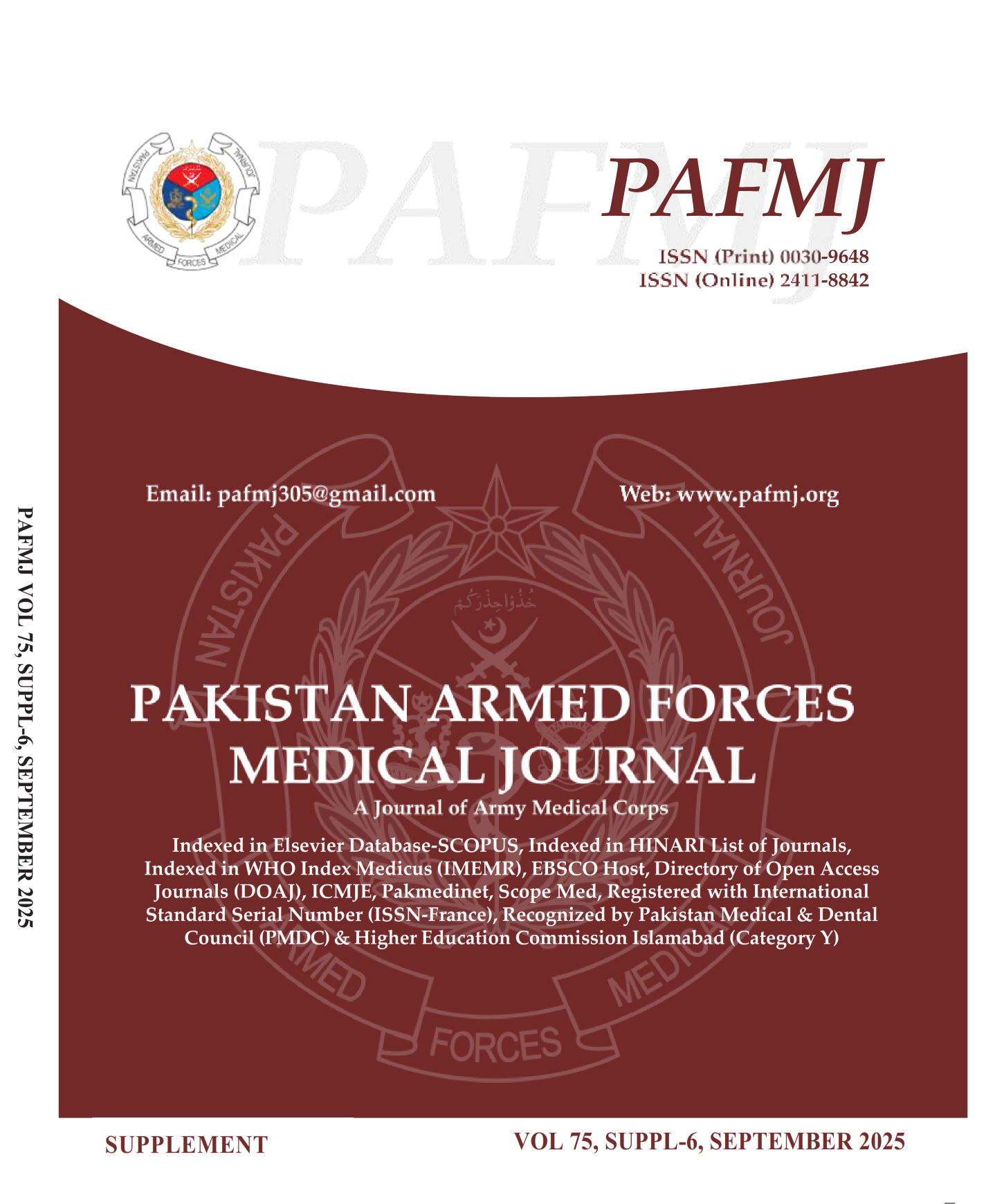Seasonal Variation In The Occurrence, Severity And Outcome Of Acute Limb Ischemia
DOI:
https://doi.org/10.51253/pafmj.v75iSUPPL-6.9056Keywords:
Acute limb Ischemia, Embolectomy, Rutherford classification, SeasonsAbstract
Objective: To evaluate whether seasonal variation is present in the incidence, severity and prognosis of ALI.
Study Design: Retrospective longitudinal study
Place and Duration of Study: Department of Vascular surgery CMH Rawalpinidi from Jan 2021 to March 2022
Methodology: All the patients aged between 15 and 80 years with clinical diagnosis of Acute limb Ischemia confirmed by ultrasound doppler or Computed tomography angiogram warranting any intervention were included in the study. Rutherfords acute limb ischemia grade, limb involved were, co-morbid conditions and time of onset of symptoms were noted. Demographic data as time of year, surgical procedure done, outcome at time of discharge and at three months follow up were also analyzed.
Results: A total of 191 patients underwent embolectomies. There were 129 males (67.5%) and mean age of the was 58.24±10.113 years. In winters there were 86(45%) operations (21.5 surgeries per month), whereas in summer season there were 50(26.2%) (12.5 cases per month) cases (p value <0.001). In winters around 55(49.1%) patients presented with Rutherford’s grade II, whereas, in summers 20(17.8%) patients had grade II ALI (p-value=0.022). Similarly, more patients suffered from complications during cold weather (p-value=0.011).
Conclusion: There is seasonal variation in the incidence of ALI. Severity of disease is also more during the winter weather and patients presenting during cold weather have higher chances of complications.
Downloads
References
1. Olinic DM, Stanek A, Tătaru DA, Homorodean C, Olinic M. Acute limb ischemia: an update on diagnosis and management. Journal of Clinical Medicine. 2019; 8(8): 1215.
2. Veenstra EB, Van der Laan MJ, Zeebregts CJ, De Heide EJ, Kater M, Bokkers RP. A systematic review and meta-analysis of endovascular and surgical revascularization techniques in acute limb ischemia. Journal of Vascular Surgery. 2020; 71(2): 654-68.
3. Obara H, Matsubara K, Kitagawa Y. Acute limb ischemia. Annals of vascular diseases. 2018: ra-18.
4. Knowles M, Timaran CH. Epidemiology of acute critical limb ischemia. In Critical Limb Ischemia 2017 (pp. 1-7). Springer, Cham.
5. Liang S, Zhou L, Ye K, Lu X. Limb salvage after percutaneous mechanical thrombectomy in patients with acute lower limb ischemia: a retrospective analysis from two institutions. Annals of Vascular Surgery. 2019; 58: 151-9.
6. Darwood R, Berridge DC, Kessel DO, Robertson I, Forster R. Surgery versus thrombolysis for initial management of acute limb ischaemia. Cochrane Database of Systematic Reviews. 2018(8).
7. Creager MA, Kaufman JA, Conte MS. Acute limb ischemia. New England Journal of Medicine. 2012; 366(23): 2198-206.
8. Kuukasjarvi P, Salenius JP, Lepantalo M, Luther M. Weekly and seasonal variation of hospital admissions and outcome in patients with acute lower limb ischaemia treated by surgical and endovascular means. International angiology. 2000; 19(4): 354.
9. Law Y, Chan YC, Cheng SW. Impact of ambient temperature on incidence of acute lower limb ischemia. Annals of Vascular Surgery. 2017; 44: 393-9.
10. 10 Lashari MN, Alam MT, Khan MS, Bawany FI, Qayoom M, Soomro K. Variation in admission rates of acute coronary syndrome patients in coronary care unit according to different seasons. J Coll Physicians Surg Pak. 2015; 25(2): 91-4.
11. 11 Khan M, Shah FU. Seasonal variations in stroke: A study in a teaching hospital of khyber pakhtunkhwa. Journal of Medical Sciences. 2017; 25(3): 292-6.
12. Riaz A, Shaikh FA, Riaz A, Rehman ZU, Sophie Z, Siddiqu NA. Why do patients with limb ischaemia present late to a vascular surgeon? A prospective cohort study from the developing world. The Journal of the Pakistan Medical Association. 2019; 69(Supl. 1): S3.
13. Takahara M, Iida O, Soga Y, Hirano K, Yamaoka T, Kawasaki D, Suzuki K, Suematsu N, Shintani Y, Miyashita Y, Kaneto H. Seasonal variation in critical limb ischemia requiring endovascular therapy: an analysis of a multicenter database of japanese patients with critical limb ischemia undergoing endovascular therapy. Journal of Atherosclerosis and Thrombosis. 2013: 18283.
14. Takahara M, Iida O, Soga Y, Kodama A, Terashi H, Suzuki K, Sugimoto I, Azuma N. Heterogeneity of age and its associated features in patients with critical limb ischemia. Annals of Vascular Diseases. 2020: oa-20.
15. McNally MM, Univers J. Acute limb ischemia. Surgical Clinics. 2018; 98(5): 1081-96.
16. Soni RG, Patel S, Pahuja M, Changal K, Sheikh M. Seasonal Variation for Acute Limb Ischemia Related Hospitalizations. Arteriosclerosis, Thrombosis, and Vascular Biology. 2019; 39(Suppl_1): A253-.
17. Earnshaw JJ, Whitman B, Foy C. National Audit of Thrombolysis for Acute Leg Ischemia (NATALI): clinical factors associated with early outcome. J Vasc Surg 2004; 39: 1018-25.
18. Ikäheimo TM. Cardiovascular diseases, cold exposure and exercise. Temperature. 2018; 5(2): 123-46.
19. Alba BK, Castellani JW, Charkoudian N. Cold‐induced cutaneous vasoconstriction in humans: function, dysfunction and the distinctly counterproductive. Experimental Physiology. 2019; 104(8): 1202-14
Downloads
Published
Issue
Section
License
Copyright (c) 2025 Malik Waseem Babar, Anas Bin Saif, Ayesha Masood, Muhammad Jamil, Irfan ., Khalid Siddique

This work is licensed under a Creative Commons Attribution-NonCommercial 4.0 International License.















